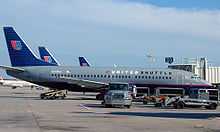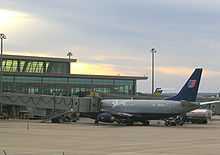Shuttle by United
Shuttle by United was an "airline within an airline" operated as a subsidiary of United Airlines from 1994 to 2001 along the West Coast of the United States. It operated from San Francisco International Airport (SFO) and Los Angeles International Airport (LAX). Shuttle's fleet consisted of Boeing 737-300s and Boeing 737-500s.
The recession of the early 1990s and the expansion of low-cost carriers and other effects of deregulation pressured the major airlines to reduce costs and fares. In 1993 United Airlines concluded an agreement with its unions whereby employees would take ownership of 55% of the airline in exchange for reduced wages and benefits for new employees. The management moved to organize the lowest scales into a new "airline within an airline" dubbed "U-2".

"U-2" attempted to replicate some of the cost advantages of regional competitors such as Southwest Airlines. All 58 of its aircraft were of a single type, the Boeing 737. Hot meals were eliminated. The fare structure would be reduced and simplified to lure passengers, with revenue stabilized by increasing frequency of service, while electronic ticketing would reduce costs.
At the same time, "U-2" would remain legally part of United Airlines, with access to its Apollo Computer Reservation System. Passengers would still enjoy pre-assigned seating, could transfer seamlessly to and from "mainline" service, and accumulate miles in United's Mileage Plus frequent flyer program. In this respect, it resembled competitors' first generation "airline within an airline" divisions such as Continental Lite, Delta Express, and US Airways' Metrojet.
Shuttle by United, as "U-2" became known, began operating on October 1, 1994, out of SFO. It offered flights to Los Angeles for as little as $19 one-way. Within three years it had expanded to 20 cities and comprised 5% of United's total capacity. In 1999 it established a second base in Terminal 8 of Los Angeles International Airport, United's newest hub, by which time it also served as a feeder operation for United's transcontinental and international services. In the late 1990s its name was changed to United Shuttle.

With demand for travel to the San Francisco Bay Area heavy during the Dot-com bubble, Shuttle was profitable, but it encountered operational problems and labor unrest. Cloud cover at SFO frequently caused delays that were exacerbated by Shuttle's high frequency schedule, and compounded again by inadequate staffing. In 2000 two out of three flights between SFO and LAX were delayed or canceled.
When air travel declined in 2001 it became evident that cost savings had not materialized to justify the Shuttle, and it was folded back into mainline United.
In December 2002 United declared bankruptcy and hinted at a revival of the Shuttle. Instead it created a leisure destination carrier called Ted, part of a second generation of "airline within an airline" services along with Delta Air Lines' Song and Air Canada Tango. Ted ceased operations in early 2009 and its fleet was folded back into United's.
Destinations
Shuttle by United served the following destinations in the 1990s:[1]
- Burbank, California - Burbank-Glendale-Pasadena Airport
- Denver, Colorado - Denver International
- Las Vegas, Nevada - McCarran International Airport
- Los Angeles, California - Los Angeles International Airport
- Oakland, California - Oakland International Airport
- Ontario, California - LA/Ontario International Airport
- Phoenix, Arizona - Phoenix Sky Harbor International Airport
- Sacramento, California - Sacramento International Airport
- San Diego, California - San Diego International Airport
- San Francisco, California - San Francisco International Airport
- Seattle, Washington - Seattle-Tacoma International Airport
See also
- Delta Express a low-cost subsidiary of Delta from 1996 until 2003 that preceded Song
References
- Fernandez, Elizabeth. "United's infrequent flier" San Francisco Chronicle, 6 May 2001
| ||||||||||||||||||||||||||||||||||||||